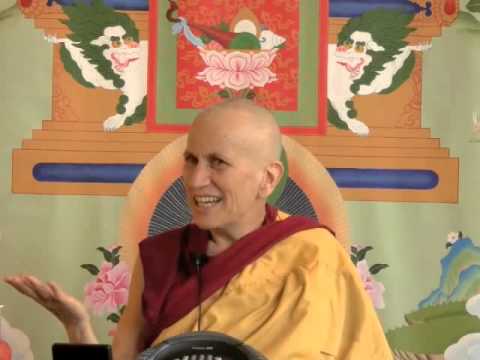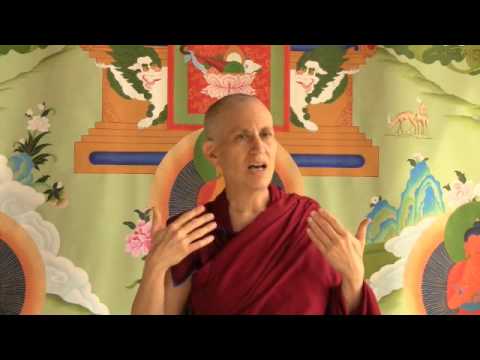Six root afflictions: Wrong views, part 2
Stages of the Path #107A: The Second Noble Truth
Part of a series of Bodhisattva's Breakfast Corner talks on the Stages of the Path (or Lamrim) as described in the Guru Puja text by Panchen Lama I Lobsang Chokyi Gyaltsen.
We’re continuing with the different kinds of wrong views. We left off on:
Those who claim a doctrine of conscious postmortem survival.
It sounds like a doctor, doesn’t it? [laughter] In other words, it’s the belief that there’s some kind of soul that is conscious, that’s inherently existent, and stays with us after death.
Those who claim a doctrine of unconscious postmortem survival. Those who claim a doctrine of neither conscious nor unconscious postmortem survival. Annihilationsists who proclaim the annihilation, destruction and non-existence of beings. And those who are proclaimers of nibbana here and now.
We can see from this that there are a whole range of different kinds of views that people have. Some are standardized into different theories, philosophies and religions and some are just ideas that float through people’s minds. Just as this is the case now, it was certainly the case in the time of the Buddha, too. Everybody who has a mouth speaks about a philosophy. [laughter] That’s what it feels like sometimes, doesn’t it?
In those sutras, the Buddha went into more depth about what these specific views were and then of course refuted them. But they basically boil down to either being eternalists—thinking that there’s some kind of permanent soul, some kind of truly existent something—or nihilists. And there are a whole variety of nihilists, not just one brand. There are many different kinds of nihilists.
In a couple of other sutras, the Buddha pinpointed three types of nihilistic views as being the specific ones we don’t want to get involved in because they are contrary to attaining liberation. The first kind of nihilism is a view that denies any continuation of the person after death. In other words, it’s a view that says, “After death, there is nothing.” That’s what I used to believe. It’s like, “Yeah, we’re just bodies, and I don’t know what the mind is, and none of these religious theories make sense, so after death, you die. You’re dead. There’s nothing.” That’s what I thought for many years. Many people think that.
And especially if you think the mind, the consciousness, is an emergent property of the body then when the body dies, the mind is completely discontinued. There’s nothing left whatsoever. That’s one form of nihilism. In that view, there are no future lives, so there’s no karma, no liberation—nothing. It all just totally ceases at the time of death.
Then the second one is a nihilistic view about the existence of constructive and destructive actions. This is somebody who may say there’s no ethical distinction between actions. It’s the view that thinks, “There’s no good. There’s no bad. It’s just all relative. It’s up to your mind. It’s this or that.” It’s kind of a flippant view. It can also be a fatalistic or predetermination view that says we’re fated or predetermined: there’s already a lesson plan designed by a creator that we’re living; everything’s predetermined. Also in that view of predetermination there’s no constructive and or destructive actions that can influence what we experience in the future because it’s all predetermined. That’s another nihilistic view.
The third nihilistic view denies that things happen due to causes. It’s the view that says, “Things are random. There are no causes. Or there may be causes, but the causes don’t have to correspond to the result. You can plant peaches and get plums. There’s no correspondence at all between cause and effect.”
These are the three kinds of Nihilistic views. First is that there’s a complete discontinuation of the person at death. Second is that there’s no ethical dimension to our actions—no virtue or nonvirtue, no actions that are conductive for happiness or for suffering. And third is thinking that things happen totally without any causes whatsever. These are all Nihilistic views because they’re denying things that in fact do exist. And you can see that if you hold these nihilistic views then it’s very easy to live a life without any ethical restraint. “Hey, when I die it’s all over, so I might as well be as hedonistic as I want,” or “There’s no good or bad actions, so I can do what I want,” or “Things happen randomly without any causes at all, so I can do what I want.”
These kind of views feed into an egotistical tendency that makes the I very big. “I can do what I want; I can get what I want—I, I, I.” Then these views really make all of that possible, so they are quite dangerous. We need to look inside and see if we have any of those views.
Then, if we find any of those views, we need to first of all see the disadvantages of these views. This isn’t to say, “I shouldn’t think this way,” but to understand the disadvantages. And then when we see the disadvantages, we should examine whether these views are based on any kind of reasoning or any kind of experience. “Is there any evidence I can call forth, either from personal experience or reasoning, that I can use to support these views? Or is there evidence that I can call forth, again from personal experience or reasoning, that refute these kinds of views?” It’s important to really examine very clearly with our intelligence to see if these kind of views hold water or not.
Venerable Thubten Chodron
Venerable Chodron emphasizes the practical application of Buddha’s teachings in our daily lives and is especially skilled at explaining them in ways easily understood and practiced by Westerners. She is well known for her warm, humorous, and lucid teachings. She was ordained as a Buddhist nun in 1977 by Kyabje Ling Rinpoche in Dharamsala, India, and in 1986 she received bhikshuni (full) ordination in Taiwan. Read her full bio.


